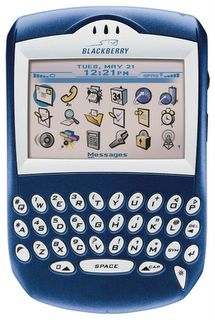The US Government intercedes in the BlackBerry dispute
 I've carefully read the US Government's statement to the court regarding the NTP patent lawsuit against RIMM (the maker of BlackBerries). And I've noticed some interesting tidbits that haven't been mentioned in the news. The government stated:
I've carefully read the US Government's statement to the court regarding the NTP patent lawsuit against RIMM (the maker of BlackBerries). And I've noticed some interesting tidbits that haven't been mentioned in the news. The government stated:| ...in the formulation of any injunction, it is imperative that some mechanism be incorporated that permits continuity of the federal government’s use of BlackBerry™ devices and establishes some procedure for identifying those devices that lie outside the scope of any injunction entered in this action... |
Okay, the US Government wants to keep their BlackBerries operational whether or not an injunction occurs. Fair enough. But...
| ...in NTP’s Proposed Scheduling Order, filed November 1, 2005, it stated that it will propose an injunction with exceptions for federal, state and local governments, as well as first responders, such as the American Red Cross... |
If this interpretation is correct, then, in the event of an injunction, RIMM must be permitted time to acquire and filter all federal, state, and local user network traffic. That is, someone will have to assemble a comprehensive list of all federal BlackBerry users, government contractors, the affected personnel in all fifty states, a countless number of localities and first responders, etc.... before the injunction can be levied!
And, to complicate matters further:
| ...according to RIM, it does not maintain a listing of e-mail addresses associated with government users, so that one might attempt to segregate addresses that end in .gov or .mil... Rather, RIM relies upon a PIN (Personal Identification Number) as a means of uniquely identifying every BlackBerry™ device. Thus, there is no simple way in which federal government users can be easily identified to assure that their service is not being cut off along with commercial users. The same would apply to state and local governments, and any other authorized users... |
No wonder RIMM seems to be dawdling. Just assembling that that list might take longer than the US Patent and Trademark Office's final determination on the patents.
And here's another interesting tidbit:
| ...After recognizing that BlackBerry™ devices permitted emergency communications during times when other communications systems were inoperative, Congress issued them to every member... |
Every member of Congress has a BlackBerry? That's quite a constituency.
The Government also mentions the patent review, in which the USPTO has ruled (in a preliminary determination) that some of NTP's patents may be predated by "prior art", which would render them useless.
| ...It is further worth noting that the five patents involved here are all undergoing re-examination by the Patent and Trademark Office (PTO). Given the potential complexity and expense involved in inventorying the government’s BlackBerry™ devices, it may make sense to stay any consideration of the reimposition of the injunction for at least 90 days, during which time the PTO may issue a final decision regarding the re-examination... |
The phrase "may issue" is interesting. Why would the PTO make a final determination within 90 days? Unless, of course, something is happening behind the scenes...
Lastly, the government notes that civilian users will be impacted:
| ...There may also be a substantial public interest that would be impaired by enjoining commercial use of BlackBerry™ devices... it is quite possible that there is a strong public interest in being able to convey health or public emergency warnings to non-governmental users who have BlackBerry™ devices, and can take immediate action in response to such information... |
Having read the entire statement, I think I now understand why RIMM is playing "four corners".
US government steps in to BlackBerry litigation
Update 12/10/2005: Forbes notes that in the few cases the Government interceded with a similar sort of patent dispute, the Judge determined no injunction was necessary and/or threw the case out. While the latter possibility is unlikely, patent lawyer Jesse J. Jenner, partner at Ropes & Gray called the letter 'very powerful' and likened it to eminent domain.

No comments:
Post a Comment